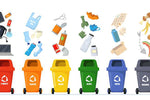
The Consumer's Guide to Making Recycling Work
, by Planet Green, 3 min reading time

, by Planet Green, 3 min reading time
Consumer Recycling is a collective responsibility that starts at home. It's not someone else's problem, and we can't simply toss our waste into the recycling bin and expect it to magically save the environment. As consumers, to truly make a difference, we need to understand how recycling works and actively participate in the process to ensure that recycling efforts are effective and environmentally friendly.
First, understanding the need for recycled products. Recycling begins with a demand for recycled materials. Just throwing plastics into the weekly recycle bin isn't enough to save the environment, especially if no-one wants that material for any kind of recycling. The quality of the items being recycled, along with their proper disposal, significantly impacts the recycling process. Here are some key points to consider:

It’s important to know what can and what can’t be recycled. This may be different in your community when compared to someone else’s. To be effective recyclers, consumers must educate themselves about what items can and cannot be recycled. This knowledge is the foundation of responsible recycling. Here are some tips to help:
To complete the recycling cycle, consumers should support the use of recycled and remanufactured products. Here's how consumers can further contribute to a circular economy:
Recycling isn't just a buzzword; it's a vital practice that every consumer can participate in to protect our environment. By understanding the need for recycled products, knowing what can and can't be recycled, and supporting a circular economy, consumers can make a meaningful impact on reducing waste and conserving resources.

Plastic is designed to be durable. That durability makes it useful during a product’s life - but it also means plastic remains long after its...

Modern consumption moves fast. Products are manufactured, used briefly, and discarded—often in rapid succession. This constant motion drives resource extraction, increases waste, and places growing...

Environmental impact doesn’t reveal itself on a daily schedule. It doesn’t spike immediately after something is thrown away, and it rarely produces instant consequences. Instead,...

When people think about environmental responsibility, attention often goes to the biggest and most visible problems—industrial pollution, overflowing landfills, or massive plastic debris. While those...